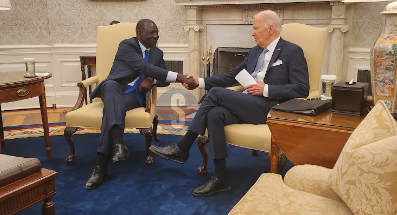Negotiators for the Kenya-US trade deal are shifting their focus to public input as talks enter the sixth round, aiming to conclude by the end of December. Public participation will be a key component of the upcoming stakeholder listening session, which is part of the next negotiating round set to take place in Mombasa for the first time.
Trade Principal Secretary Alfred K’Ombudo and Assistant United States Trade Representative Constance Hamilton will lead the weeklong negotiations.
Kenya’s Investments, Trade and Industry ministry announced that both parties have agreed to continue negotiating high-standard commitments in various areas to boost investment, promote sustainable and inclusive economic growth, benefit workers, and support African regional economic integration.
Public participation opens the deal to critique and proposals from civil society, individuals, and the private sector. This comes amid earlier concerns that the deal might favor the US more, particularly as it seeks comprehensive market access for its agricultural goods in Kenya by reducing or eliminating tariffs.
According to the Center for Strategic and International Studies (CSIS), there is a call for the elimination of duties on goods such as agricultural products, including the 25 percent duty on US pork.
In 2021, the US average effective applied tariff on Kenyan imports was 0.4 percent, while Kenya’s agriculture sector presented the highest barriers to US exports, with an average tariff of 20.3 percent and still relatively high tariffs on dairy (51.7 percent), animal products (23.1 percent), and cereals (22.2 percent).
Opening the market for more US agricultural products is seen as a potential impediment to Kenya’s agriculture sector, which is still building up value-addition chains.
Econews Africa, a pan-African research and advocacy organization, and the Kenya Small Scale Farmers Forum (KESSFF) have argued that entering a free trade pact with the US could create an “uneven playing field” that disadvantages poor farmers in poorer countries, while large agribusinesses benefit from agricultural trade liberalization.
“In the case of agriculture especially, we note that an agreement between a developing country like Kenya and a country that is one of the top agricultural exporters in the world is likely to have a significant impact on Kenya,” Econews executive director, Edgar Ondari, said.
Concerns have arisen over several key chapters in the Kenya-US trade negotiations, including digital trade, anti-corruption measures, good regulatory practices, environmental and climate action, and workers’ rights and protections. Public participation for these discussions is set to begin on Thursday.
Despite the ongoing negotiations, Kenya currently enjoys preferential terms for its exports under the African Growth and Opportunity Act (AGOA) pact.
During the fifth round of negotiations in Washington last month, Kenya’s Trade and Investment Cabinet Secretary Rebecca Miano and United States Trade Representative Katherine Tai reaffirmed their commitment to concluding a deal that aligns with mutually shared goals and values.
In a statement made on Monday, Miano emphasized that the deal aims to promote workers’ rights and protections, advance environmental and climate change objectives, and provide greater transparency in regulatory processes and customs procedures.
Additionally, it seeks to enhance cooperation on enforcement and promote science- and risk-based sanitary and phytosanitary measures along with sustainable agricultural practices.
“We have made substantial strides in several key areas. These include anticorruption measures, support for micro, small, and medium-sized enterprises (MSMEs), domestic regulation of services, and the initial draft of the agriculture text,” Miano said.
She highlighted that these provisions are strategically designed to facilitate agricultural trade, combat corruption, empower MSMEs, and ensure fair treatment of service suppliers, all of which are crucial for economic growth and stability.
However, trade currently favors the US, as Kenya’s earnings from exports decreased to Sh64.4 billion last year from Sh79.9 billion the previous year, according to the Economic Survey 2024.
The country on the other hand imported goods worth Sh112.8 billion from, an increase from Sh93.4 billion in 2022.



